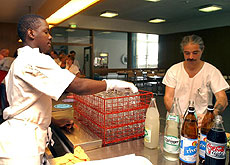Subtle tensions mar race relations

A study of the black community in Switzerland has found that racism is more prevalent in some areas and that the minority is generally treated with mistrust.
But does the report – the first of its kind – give an accurate picture of life for black people?
“I think the study is very precise and gives quite a few details of day-to-day racism and how black people are being treated on the streets and in their homes,” Paula Charles told swissinfo.
The 49-year-old daughter of West Indian parents, Charles spent her childhood in the Caribbean before coming to continental Europe when she was 21.
“I get insulted almost every second or third day, mostly by older people. I’m looked at very badly, and, after 20 years in Switzerland, I feel more of a stranger now than ten years ago.”
But it has been quite a different experience for Celia Müller-Hernandez, who was born in the Dominican Republic.
“People here accept me as I am – as soon as I speak the local dialect, they feel like I belong here,” said Müller-Hernandez.
Black and white
She does not deny that there is racial discrimination in Switzerland but claims that she has not been a victim of it.
“When I came to Switzerland 22 years ago, I thought people were polite to me but they treated me with distance, they didn’t open their hearts at first,” said Müller-Hernandez.
Having grown up in both the Dominican Republic and Puerto Rico, Müller-Hernandez said she felt racism was stronger in the Caribbean.
“Racism among blacks is more subtle and hurts more,” she added.
The language teacher is critical of the report, which was based on interviews with 27 black people living in different regions of Switzerland.
“I wonder whether it is a very representative study. Maybe they should take more people and then they would find out that not everybody feels the same way,” she said.
Qualitative study
Carmel Fröhlicher-Stines, a psychologist and co-author of the report, refutes the notion of arbitrariness. She herself is black, originating from Haiti and has lived in Switzerland since 1971.
“We included as wide a variety of black people as possible, from different social classes and with different years of living experience in Switzerland.”
Fröhlicher-Stines said it was hard work finding the people who were willing to talk about their lives and who fitted the criteria for the qualitative research project published earlier this year.
Defending the decision to restrict the number of people interviewed, Fröhlich-Stines explained that, during the hour-long interviews, people could narrate their stories and express what they really thought and felt.
“You can’t do more than 30 interviews like that unless you have a few years to do it,” she added.
Fröhlicher-Stines said she was astonished by how much the answers given by interviewees had in common.
“They feel foreign and not accepted, regardless of whether they speak the local Swiss language and even if they are children of racially mixed parents or a child of a black couple who had moved to Switzerland years ago.”
The study, first published in January, listed disdainful looks, verbal abuse, selective disregard and “being made to feel invisible” as the main forms of racist behaviour.
Speak the language
Researchers found striking regional differences. Respondents from western Switzerland said they felt more at ease and accepted as part of a multicultural society, partly because of language reasons and the proximity to France.
In the Italian-speaking region of the country, black people said the authorities took them seriously.
These observations contrast sharply with answers from black people living in the German-speaking part of Switzerland, views which are endorsed by Charles.
In her experience, the German-speaking region is extremely harsh towards blacks.
“It’s very sneaky and subtle sometimes,” said Charles, a former strip-club dancer and author of two books.
She blames the tension on rightwing politicians who use blacks as scapegoats for any problems experienced by society.
Charles said she found the presence of police in the streets intimidating and that she had also witnessed police brutality towards black men.
“Police officers have this sort of arrogant power that frightens anyone who is a foreigner in this country,” she explained.
Charles and Müller-Hernandez welcomed recommendations by researchers that an independent complaints authority be set up and that awareness campaigns could help address the issue of racism.
“We are weak and we don’t have any resources in this country to help ourselves,” said Charles.
Müller-Hernandez is optimistic in her outlook: “Things are changing and they will improve with an increasing number of racially-mixed couples.”
swissinfo, Urs Geiser
The report, published by Federal Anti-Racism in January, found that black people are the victims of daily discrimination and racism.
The study calls for an independent appeals body and awareness campaigns, especially in schools.
Black people make up 0.6% of the Switzerland’s resident population – about 45,000 people.
Carmel Fröhlicher-Stines, psychologist and co-author of the study, was born in Haiti, educated in the US, Germany and Switzerland. She moved to Zurich in 1971.
Celia Müller-Hernandez was born in the Dominican Republic and grew up in Puerto Rico. She graduated in Spanish language and literature. She came to her husband’s native country 22 years ago.
Paula Charles, British-born of West Indian immigrants. She published two autobiographical books about her life in the Caribbean and as a former cabaret dancer in Germany and Switzerland. She has been living in Switzerland for more than 20 years.

In compliance with the JTI standards
More: SWI swissinfo.ch certified by the Journalism Trust Initiative











You can find an overview of ongoing debates with our journalists here . Please join us!
If you want to start a conversation about a topic raised in this article or want to report factual errors, email us at english@swissinfo.ch.